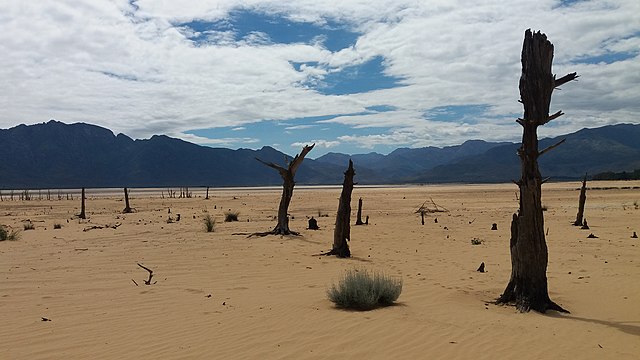 Have you ever thought about how much water you use in a day?
Have you ever thought about how much water you use in a day?
Starting February 1st, each person in Cape Town, South Africa will receive a daily allowance of 13.2 gallons of water, a supply easily exhausted by a 10-minute shower!
This restriction was introduced in preparation for April 22nd, also known as Day Zero, on which the city will turn off all municipal water taps due to the depletion of freshwater supplies.
What Happened to the Water?
Over the past three years, Cape Town has endured a dangerous drought. That, along with a growing population of four million people, has caused water-supply dam levels to drop drastically.
As of November 2017, their largest water reservoir had dropped to 28% capacity from 102.9% in 2014. That amount is expected to come down to 13.5% by April 22, 2018. The last 10% of the reservoir's levels are not potable (safe to drink) due to silt and debris.
Cape Town could become the first-ever major city to run out of water. More years with record low levels of precipitation (rain, snow, etc) are being predicted, largely due to climate change. According to NASA scientists, as the global climate continues to increases in temperature, rain patterns are shifting.
New Regulations
 The government has taken precautions to conserve the little water they have left. They have banned car washing and filling up of swimming pools. They are urging the public to cut showers to two minutes and reuse bathing water to flush the toilet.
The government has taken precautions to conserve the little water they have left. They have banned car washing and filling up of swimming pools. They are urging the public to cut showers to two minutes and reuse bathing water to flush the toilet.
Some can afford to order water delivery from parts of the country not affected by the drought. But for residents in Cape Town, a typical day is changing. Starting in February, residents are being asked to restrict themselves to a two-minute shower, flushing the toilet once, washing dishes once, washing their hands twice, and cooking one meal.
When Cape Town reaches Day Zero, citizens will have no choice but to abide by the regulations. As water is cut off there will be 200 water stations scattered across the town where people will receive their daily allowance of 6.6 gallons.
Armed guards will stand by to ensure there is no violence or theft. Tensions are also high in the area, as neighbors are encouraged to report their peers for wasting water.
Finding Alternate Sources
The government has made progress towards establishing alternative water sources like reusing wastewater, drilling into groundwater, and desalination (making ocean water safe to drink). However, these efforts will not be in effect for some time, especially not before the Day Zero deadline.
The water shortage has already impacted all sectors of Cape Town. People's livelihoods are being affected, with those in the tourism industry and businesses like car washing, seeing no alternative to making a living. The government is also proposing a drought tax to collect the tax money they are losing due to low water consumption.
Despite the bleak conditions in Cape Town, hope can be found in places like Australia and Israel, both of which recovered from prolonged drought and water depletion by recycling wastewater and through community conservation efforts.
Water sources are not unlimited. Without a shift in society's global consumption, we risk more crises like that of Cape Town.
Do your part by being aware throughout the day of your water consumption. Sit down with your family and use a water footprint tracker to see where within your life you use the most water and tips to reduce your consumption.
Sources: BBC, Al Jazeera, Livescience, NASA.gov, Time, home-water-works







